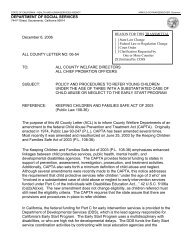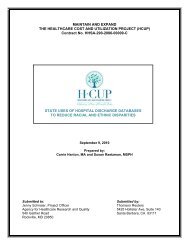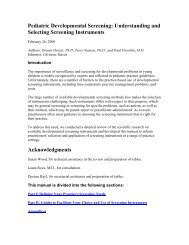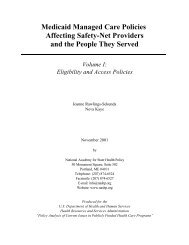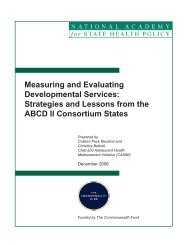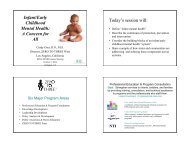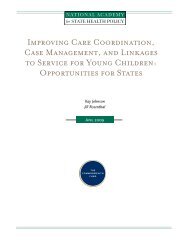Developing Federally Qualified Health Centers into Community ...
Developing Federally Qualified Health Centers into Community ...
Developing Federally Qualified Health Centers into Community ...
You also want an ePaper? Increase the reach of your titles
YUMPU automatically turns print PDFs into web optimized ePapers that Google loves.
• HIP provides a stream of insured patient referrals for other FQHC services, most<br />
notably dental care. While some FQHCs do not have spare capacity, others are eager<br />
to take advantage of these additional opportunities for revenue and have been able to<br />
hire more staff and significantly expand operations. An FQHC in Missoula reported<br />
that participation in HIP has brought in more covered visits to its behavioral health<br />
specialists.<br />
• An FQHC looking to provide care management services for its patients may not have<br />
sufficient internal demand to justify hiring a care manager. For example, an FQHC in<br />
Butte described its previous care management services as being a ―patchwork.‖ HIP<br />
has allowed this health center to hire a registered nurse care manager, which also<br />
gives it more credibility, and consequently better relations, with hospitals and<br />
providers.<br />
• HIP provides training opportunities and ongoing funding for FQHCs to develop<br />
expertise in care management. <strong>Health</strong> centers are finding that this furthers their own<br />
efforts to develop <strong>into</strong> high-performing medical homes that can better serve their<br />
existing patient bases.<br />
The PCA and FQHCs have identified opportunities for improvement:<br />
Avoiding care manager burnout. The nature of HIP demands that care managers<br />
work almost exclusively with a sick, high-needs population. Although the turnover<br />
among care managers has been quite low, FQHC staff are acutely aware of the need to<br />
guard against staff burnout as the program matures. Suggestions to do so include enlisting<br />
other staff, such as receptionists and community health workers, to help care managers<br />
contact and follow up with patients.<br />
Focusing resources on new beneficiary outreach. HIP care managers spend a<br />
great deal of time trying to establish and maintain relationships with hard-to-reach<br />
clients. (As mentioned previously, at any time about one-third of HIP beneficiaries are<br />
unresponsive or unreachable.) To address this challenge, care managers need the help of<br />
administrative support staff with strong ―sleuthing‖ skills, as well as access to timely<br />
information from Medicaid. Such information from Medicaid, ideally delivered through a<br />
shared database, could provide a care manager with valuable tips, such as the location of<br />
a pharmacy where a patient picked up a recent prescription.<br />
Accessing clinical information. HIP care managers are not always able to access<br />
up-to-date clinical information from private providers, hospitals, and other caregivers.<br />
For obvious reasons, this can complicate care management. Electronic health information<br />
12



